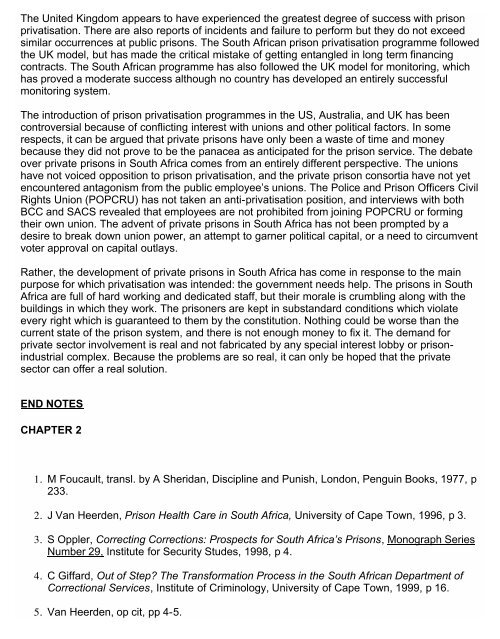prison privatisation in south africa issues, challenges and ...
prison privatisation in south africa issues, challenges and ...
prison privatisation in south africa issues, challenges and ...
You also want an ePaper? Increase the reach of your titles
YUMPU automatically turns print PDFs into web optimized ePapers that Google loves.
The United K<strong>in</strong>gdom appears to have experienced the greatest degree of success with <strong>prison</strong><br />
<strong>privatisation</strong>. There are also reports of <strong>in</strong>cidents <strong>and</strong> failure to perform but they do not exceed<br />
similar occurrences at public <strong>prison</strong>s. The South African <strong>prison</strong> <strong>privatisation</strong> programme followed<br />
the UK model, but has made the critical mistake of gett<strong>in</strong>g entangled <strong>in</strong> long term f<strong>in</strong>anc<strong>in</strong>g<br />
contracts. The South African programme has also followed the UK model for monitor<strong>in</strong>g, which<br />
has proved a moderate success although no country has developed an entirely successful<br />
monitor<strong>in</strong>g system.<br />
The <strong>in</strong>troduction of <strong>prison</strong> <strong>privatisation</strong> programmes <strong>in</strong> the US, Australia, <strong>and</strong> UK has been<br />
controversial because of conflict<strong>in</strong>g <strong>in</strong>terest with unions <strong>and</strong> other political factors. In some<br />
respects, it can be argued that private <strong>prison</strong>s have only been a waste of time <strong>and</strong> money<br />
because they did not prove to be the panacea as anticipated for the <strong>prison</strong> service. The debate<br />
over private <strong>prison</strong>s <strong>in</strong> South Africa comes from an entirely different perspective. The unions<br />
have not voiced opposition to <strong>prison</strong> <strong>privatisation</strong>, <strong>and</strong> the private <strong>prison</strong> consortia have not yet<br />
encountered antagonism from the public employee’s unions. The Police <strong>and</strong> Prison Officers Civil<br />
Rights Union (POPCRU) has not taken an anti-<strong>privatisation</strong> position, <strong>and</strong> <strong>in</strong>terviews with both<br />
BCC <strong>and</strong> SACS revealed that employees are not prohibited from jo<strong>in</strong><strong>in</strong>g POPCRU or form<strong>in</strong>g<br />
their own union. The advent of private <strong>prison</strong>s <strong>in</strong> South Africa has not been prompted by a<br />
desire to break down union power, an attempt to garner political capital, or a need to circumvent<br />
voter approval on capital outlays.<br />
Rather, the development of private <strong>prison</strong>s <strong>in</strong> South Africa has come <strong>in</strong> response to the ma<strong>in</strong><br />
purpose for which <strong>privatisation</strong> was <strong>in</strong>tended: the government needs help. The <strong>prison</strong>s <strong>in</strong> South<br />
Africa are full of hard work<strong>in</strong>g <strong>and</strong> dedicated staff, but their morale is crumbl<strong>in</strong>g along with the<br />
build<strong>in</strong>gs <strong>in</strong> which they work. The <strong>prison</strong>ers are kept <strong>in</strong> subst<strong>and</strong>ard conditions which violate<br />
every right which is guaranteed to them by the constitution. Noth<strong>in</strong>g could be worse than the<br />
current state of the <strong>prison</strong> system, <strong>and</strong> there is not enough money to fix it. The dem<strong>and</strong> for<br />
private sector <strong>in</strong>volvement is real <strong>and</strong> not fabricated by any special <strong>in</strong>terest lobby or <strong>prison</strong><strong>in</strong>dustrial<br />
complex. Because the problems are so real, it can only be hoped that the private<br />
sector can offer a real solution.<br />
END NOTES<br />
CHAPTER 2<br />
1. M Foucault, transl. by A Sheridan, Discipl<strong>in</strong>e <strong>and</strong> Punish, London, Pengu<strong>in</strong> Books, 1977, p<br />
233.<br />
2. J Van Heerden, Prison Health Care <strong>in</strong> South Africa, University of Cape Town, 1996, p 3.<br />
3. S Oppler, Correct<strong>in</strong>g Corrections: Prospects for South Africa’s Prisons, Monograph Series<br />
Number 29, Institute for Security Studes, 1998, p 4.<br />
4. C Giffard, Out of Step? The Transformation Process <strong>in</strong> the South African Department of<br />
Correctional Services, Institute of Crim<strong>in</strong>ology, University of Cape Town, 1999, p 16.<br />
5. Van Heerden, op cit, pp 4-5.
















